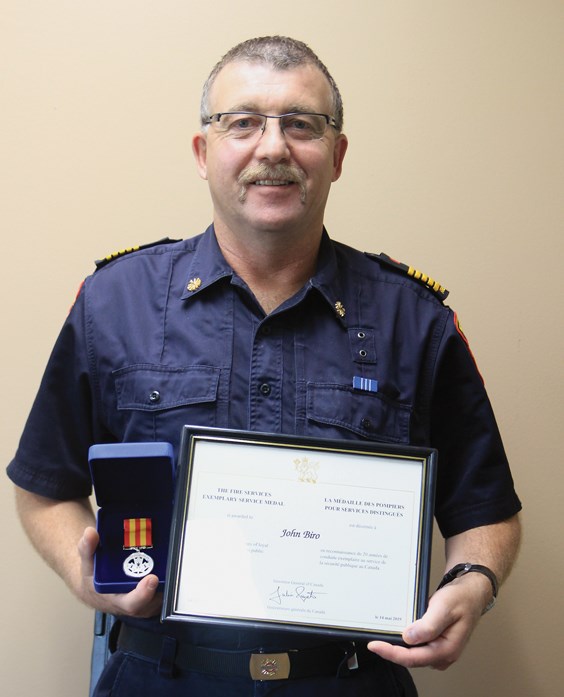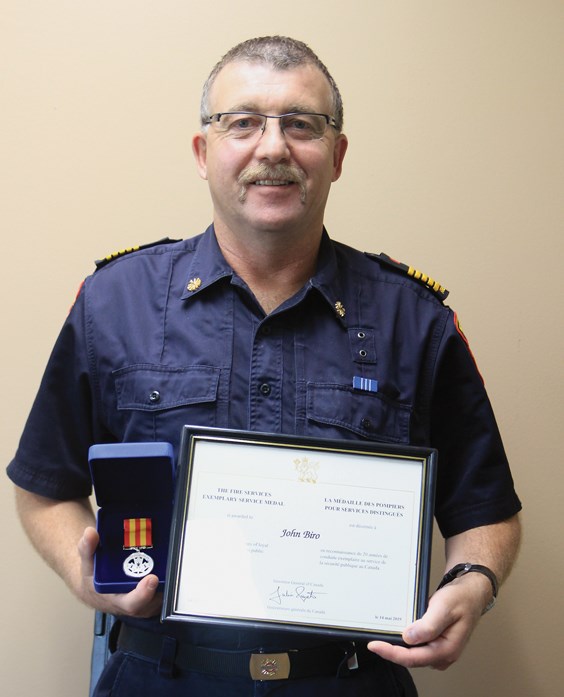 Westlock County protective services manager John Biro received the provincial Fire Services Exemplary Services Medal July 16 in recognition of his work with PTSD among volunteer fire fighters.
Westlock County protective services manager John Biro received the provincial Fire Services Exemplary Services Medal July 16 in recognition of his work with PTSD among volunteer fire fighters.
“It was always a concern when I started about going to calls and coming back and having to resume things as normal,” John Biro said of the struggle among volunteer firefighters with post-traumatic stress disorder (PTSD).
Biro, Westlock County’s manager of protective services, recently received the provincial Fire Services Exemplary Services Medal for 20 years of service and for his ongoing work in PTSD prevention and de-escalation. He was recognized by county council at its July 16 meeting.
PTSD acts with a past memory and a current experience working in conjunction. A particular smell or place could bring a traumatic event from the past back to life and the emotions of that time, into the present.
For a firefighter, the smell of burnt rubber may trigger a memory or the sight of tire marks on the pavement could do the same. The past recollection brought into the present could be the victim of a fire or vehicle collision.
“We’re no different than Edmonton or Calgary. However here, we see everything,” unlike their urban counterparts who may or may not because of a shift-based schedule.
In rural areas, volunteer firefighters respond to every call and “they’re going to see some nasty stuff,” said Biro. “There’s going to be a lot of stuff that they’re not gonna be able to forget.”
There is always a chance the person involved in an incident could be known to firefighters responding to the call — even a friend or neighbour.
It’s Biro’s past experience, the fact that he has walked in the same boots as those who currently volunteer for the county, and he understands those elements of firefighting, which makes him sympathetic to their situations.
His medal is a recognition that his actions exceed sympathy.
Since stepping in as captain with the Town of Westlock fire department in 1996 (and later with the county too), Biro took over the responsibility which his predecessor, Lyle Bernie, had instilled in him: to call the spouses of his firefighters and make sure that they were doing well when they got home too.
Biro recalls Bernie would ask the firefighters themselves too, except “we were the tough guys and we would say we’re fine, but we’d go around the corner and we’re still struggling with the call we’d seen.”
So phoning home, to the partner, was a way to make sure it was really true, and Biro continued to do it once he took over.
In 2012, Biro and wife Shauna, who has also worked in the emergency field, and is now a firefighter with the town, took a Critical Incident Stress Management Training course.
Since then, they have assisted with PTSD management in other fire departments across the province as far south as Brooks.
“We’re probably the first ones to start the peer support program in the province,” said Biro.
“We’d receive a text in the day, it would say a bad incident happened here, there’s a fatality, here’s the department, here’s a list of names.
“We’d go home, quickly have something to eat, my wife would go to one corner of the house, I’d go to the next, and we’d start checking in on firefighters. Then there’s times when we get home, hop in the vehicle and drive to a location.”
And a lot of it happened after hours.
“I couldn’t tell you how many people we’ve helped.”
Biro does recollect that some firefighters, much more experienced than him, had never received calls like that before.
There’s really no telling how someone might react when asked “are you OK?”
Symptoms of trauma can present differently among individuals as well.
“There are members that it doesn’t affect, and there’s some that it does. When you start getting into that group session … a lot of times the ones that are having difficulties dealing with it, somebody has a piece of that puzzle that they’re missing.”
These types of group sessions are more common nowadays, especially at Station 6 in Busby, where county councillor Jared Stitsen is fire chief. There is a room in the fire hall, of which Biro said members are very proud.
It acts as a safe room, a space in which these group sessions can take place, one that can store all the details firefighters release into it when they come back from an accident scene. To talk about it with each other “kind of puts things at rest,” said Biro.
The recent change in how people understand PTSD among volunteer firefighters is also reflected in the fact that mental health services have been included in their health care plans.
For Biro and others in his position, it has not been an easy road to recognition.
“What we can do is we can help our volunteers … That’s what I wanted to do, make sure that my people are looked after … If it wasn’t for them, we’d be standing by ourselves. If we go to a fire, I can tell my volunteers to move that rock for me, and they will. Otherwise, I’d be doing it by myself. So I have to look after them and their families.”



